|
|
|
Sort Order |
|
|
|
Items / Page
|
|
|
|
|
|
|
| Srl | Item |
| 1 |
ID:
142612
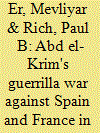

|
|
|
|
|
| Summary/Abstract |
The Riffian rebel leader Mohammed Abd el-Krim Al-Khattabi (1882–1963) became an important early guerrilla leader by successfully initiating extensively organized resistance in the Moroccan Rif against Spanish and French imperial power in the early 1920s. The Rif War triggered a wave of adventure films since the 1930s. This article will look at some of these, especially Sergeant Klems (1971) and The Wind and the Lion (1975), and suggest that they can be seen in terms of the wider impact of screen Orientalism derived from the iconic film Lawrence of Arabia (1962) directed by David Lean. The article will show that these films promoted what it terms a colonial gaze by underlining many stereotyped cinematic clichés relating to the Islamic cultural area and Abd el-Krim's revolt that stretch back to the early history of cinema.
|
|
|
|
|
|
|
|
|
|
|
|
|
|
|
|
| 2 |
ID:
152958
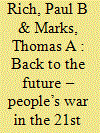

|
|
|
|
|
| Summary/Abstract |
This issue of Small Wars and Insurgencies focuses on the continuing importance of Maoist and post-Maoist concepts of people’s war. It has assembled a collection of papers that addresses various examples from around the world, with an emphasis on South America, where the premier illustration, that of Colombia’s FARC, was Marxist-Leninist but not Maoist, yet embraced the form and strategy of people’s war in a bid which at one point had the state in a critical situation. The collection comes in the wake of previous papers published in this journal on politically Maoist insurgent movements in South Asia, notably Mika Kerttuenen’s study of Maoist insurgents in Nepal and Prem Mahadevan’s survey of Maoist insurgencies in India and their links to organized crime (Kerttunen, “A Transformed Insurgency,” 78–118; Mahadevan, “The Maoist Insurgency in India,” 203–20). The papers confirm that people’s war remains an important analytical framework in the study of small wars and insurgencies, for some even a ‘model’ through which to understand distinct types of insurgent movements and their strategies.
|
|
|
|
|
|
|
|
|
|
|
|
|
|
|
|
| 3 |
ID:
161001
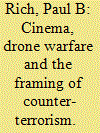

|
|
|
|
|
| Summary/Abstract |
The study of the cinematic representation is extremely useful in framing of counter-terrorism policies, whether in the US or elsewhere. This paper examines cinema’s interest in drone warfare as well as the lives and personalities of drone pilots. It argues that drone warfare suffers a considerable image problem that has been brought out in several recent features and it is unlikely that any major cinematic myth of drone warfare will easily develop, certainly in comparison to myths concerning special forces and special operations.
|
|
|
|
|
|
|
|
|
|
|
|
|
|
|
|
| 4 |
ID:
177679
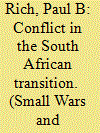

|
|
|
|
|
| Summary/Abstract |
This fairly lengthy book is a recent addition to the extensive literature on what some analysts have termed the ‘armed struggle’ in South Africa, focusing particularly on the later phase of conflict from the mid-1980s through the transition to an ANC-led government in 1994 and continuing sporadically in the years afterward. It is a work that might have some appeal to military and strategic analysts focused on guerrilla war and counter-insurgency, based as it is on some fairly extensive if narrowly focused researched. However, many of its assertions and conclusions can be seriously contested.
|
|
|
|
|
|
|
|
|
|
|
|
|
|
|
|
| 5 |
ID:
096706
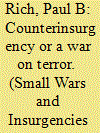

|
|
|
| 6 |
ID:
049154
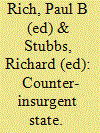

|
|
|
|
|
| Publication |
London, Macmillan Press Ltd., 1997.
|
| Description |
viii, 235p.
|
| Standard Number |
0312165277
|
|
|
|
|
|
|
|
|
|
|
|
Copies: C:1/I:0,R:0,Q:0
Circulation
| Accession# | Call# | Current Location | Status | Policy | Location |
| 038620 | 355.0218/RIC 038620 | Main | On Shelf | General | |
|
|
|
|
| 7 |
ID:
094622
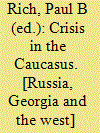

|
|
|
|
|
| Publication |
Oxon, Routledge, 2010.
|
| Description |
xxv, 246p.hbk
|
| Standard Number |
9780415544290
|
|
|
|
|
|
|
|
|
|
|
|
Copies: C:1/I:0,R:0,Q:0
Circulation
| Accession# | Call# | Current Location | Status | Policy | Location |
| 054830 | 947.58086/RIC 054830 | Main | On Shelf | General | |
|
|
|
|
| 8 |
ID:
111895
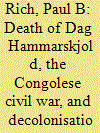

|
|
|
| 9 |
ID:
173834


|
|
|
|
|
| Summary/Abstract |
This paper examines Frances Fitzgerald’s Fire in the Lake in the context of wider ethnological research in Vietnam stretching back to the Francophone era of Paul Mus in the 1930s and 1940s. It argues that Fitzgerald’s heavily criticised book was important for raising uncomfortable issues of political legitimacy in the US military involvement in Vietnam as well as feeding into wider debates on social revolution in Vietnam and Indochina more generally. The paper concludes by arguing that Fire in the Lake has helped shift the focus in the study of Vietnam from a western-oriented, orientalist focus on American military and political mistakes towards an emphasis on the Vietnamese rebuilding of a postcolonial society anchored in Confucian precepts and values.
|
|
|
|
|
|
|
|
|
|
|
|
|
|
|
|
| 10 |
ID:
131464
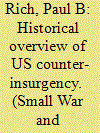

|
|
|
|
|
| Publication |
2014.
|
| Summary/Abstract |
This introductory article introduces some of the articles in this issue and examines the debate surrounding the idea of the "COINdinistas" in the US. It traces the roots of their approach to counter-insurgency and distinguishes "small c" counterinsurgency based on small groups of military advisers in "peripheral" conflicts from "big C" counter-insurgency which became allied to modernisation theory and nation building. The article also looks at developments in COIN thinking after the drawdown of US and other ISAF forces from Afghanistan, especially the work of David Kilcullen focussed on the emergence of future mega "feral" cities on coast lines vulnerable to terrorist and insurgent attacks
|
|
|
|
|
|
|
|
|
|
|
|
|
|
|
|
| 11 |
ID:
172498
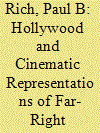

|
|
|
|
|
| Summary/Abstract |
This article argues that a major influence on the imagery of far-right terrorism in the United States derives from cinema. Most of the feature films released by Hollywood on this theme have been rather superficial and have rarely strayed beyond portraying right-wing terrorist movements in popular genres such as westerns, crime thrillers, and romantic melodramas—although not, interestingly, action adventure movies, so often the terrain for narratives involving external terrorist movements. The article contends that U.S. far-right terrorism before the 1990s was anchored in the films depicting the Ku Klux Klan; more recently, a few films have begun to engage with “new” forms of far-right terrorism involving skinheads, neo-Nazis, and “patriot” militias. Overall, remarkably few films released by Hollywood have engaged with the structure of far-right terrorist movements or the motivations of their followers. This has ensured that the movements remained shadowy organizations run, for the most part, by two-dimensional and stereotypical characters.
|
|
|
|
|
|
|
|
|
|
|
|
|
|
|
|
| 12 |
ID:
185076
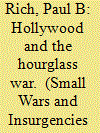

|
|
|
|
|
| Summary/Abstract |
This paper examines the cinema of the US-Mexican border in the context of an escalating drug war. It looks at movies released since the early 1980s and argues that Hollywood has supplied a large number of cinematic images of the ‘war on drugs’ that has more helped shape wider political and strategic debates. Using insights from strategic analysis, this paper seeks to show how cinema has represented the conflict between drug cartels, the Mexican state as well as various US security agencies such as the FBI, CIA, and DEA. The paper explores how these cinematic depictions straddle national boundaries and have evolved from being an extension of the western border genre in the 1980s into a more recent phase of action and war movies.
|
|
|
|
|
|
|
|
|
|
|
|
|
|
|
|
| 13 |
ID:
147714
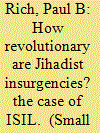

|
|
|
|
|
| Summary/Abstract |
This paper examines the rise of ISIL in the context of wider debates in the first half twentieth century on the nature and political direction of the early Bolshevik state model of Lenin, Trotsky, and Stalin. It argues that there are some parallels between the Trotskyite internationalist tendency in Soviet Russia and of ISIL given the latter’s calls for revolutionary jihad against both ‘apostate’ states in the Islamic world and, in the longer term, against the Western world as a whole. ISIL though is distinguished by its attempt to carve out a new state formation of its own in parts and Iraq and Syria, a project that may well end in failure. However, even if its so-called caliphate fails, it cannot be expected to vanish from the scene since it can either re-emerge elsewhere in a region of weak or failing states or merge with its current rival Al Qaeda.
|
|
|
|
|
|
|
|
|
|
|
|
|
|
|
|
| 14 |
ID:
089327
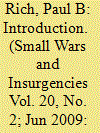

|
|
|
|
|
| Publication |
2009.
|
| Summary/Abstract |
On 8 August 2008 Russian troops invaded Georgia in a short military operation that has led to an effective Russian takeover of the South Ossetia and Abkhazia.The immediate case of the invasion was a dispute over the status of the region of South Ossetia, which up to 1990 had formed an autonomous Georgian Soviet Republic.
|
|
|
|
|
|
|
|
|
|
|
|
|
|
|
|
| 15 |
ID:
192660
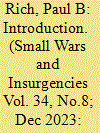

|
|
|
|
|
| Summary/Abstract |
This special issue contains five papers dealing with various aspects of climate change and its relationship to patterns of insurgency and terrorism. This is the first special issue in this journal on a topic that increasingly dominates the media and wider political discussion, though SWI has published some papers previously in this area, most notably one by Marina Malamud in 2018 that usefully categorised climate-change conflicts into four types: 1) those linked to the environment into resource-based conflict; 2) a warfare ecology paradigm referring to non-premeditated change to the environment as a result of military conflict; 3) warfare in which the environment was the target and 4) an insurgency-conflict intersection in which climate change increased the likelihood and frequency of war and conflict.Footnote1 These four categories have helped inform the approach taken in this introduction, especially the last relating to the probable impact of global climate change on insurgencies.
|
|
|
|
|
|
|
|
|
|
|
|
|
|
|
|
| 16 |
ID:
188322
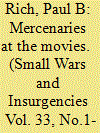

|
|
|
|
|
| Summary/Abstract |
This paper examines cinematic representations of mercenaries from the era of silent movies to the 1980s. It argues that cinema has been selective in the choice of historical periods to depict mercenaries and soldiers of fortune, ignoring for the most part the centuries of European state building in which mercenaries played a significant role. Most mercenary films are anchored in the near present and the paper focuses on Mexico and the Congo as terrains of political breakdown and external intervention. Since the 1950s, a range of films depict mercenaries in these terrains seeking money, adventure, and the thrills of killing, and the paper examines mercenary movies through the character structures of hero, anti-hero and villain. These three structures have shaped the portrayal of mercenaries in westerns and war movies as well as action and sci fi movies, where they have become hardened in the last two decades into range of stock stereotypes
|
|
|
|
|
|
|
|
|
|
|
|
|
|
|
|
| 17 |
ID:
152960
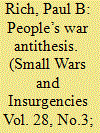

|
|
|
|
|
| Summary/Abstract |
This paper re-evaluates the role and significance of Che Guevara and focismo in the strategic debate on insurgent warfare. It argues that Guevara’s approach to making revolution in Latin America and the Third World emerged out of his own earlier escapades as a restless tourist travelling through South and Central America in the early 1950s. Guevara’s life was one marked by a struggle to define an identity in a continent that he saw as dominated by the informal imperial power of the US. Focismo crystallised in the years after the Cuban Revolution in 1959 into an ideological concept supportive of the Castro regime’s claims to provide a distinctive new model of Third World revolution in opposition to those of the Soviet Union and China. Focismo has survived in the contemporary era as an approach that partly describes some modern terrorist and Jihadist movements in the Middle East.
|
|
|
|
|
|
|
|
|
|
|
|
|
|
|
|
| 18 |
ID:
142614
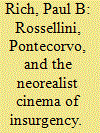

|
|
|
|
|
| Summary/Abstract |
This article examines the tradition of Italian neorealism and the importance it has for films depicting guerrilla insurgencies. It looks in particular at the two films by Roberto Rossellini Rome Open City and Paisa as well as the later film by Nanni Loy Four Days in Naples. It then proceeds to locate Gillo Pontecorvo's iconic film The Battle of Algiers within this neorealist tradition and examines the degree to which the director succeeded in continuing the basic traditions of neorealism into the context of the Algerian war of Independence. The article concludes that while this film remains of great interest it should be situated in the period when it was produced and is in many ways radically disconnected from many insurgent movements of the present day.
|
|
|
|
|
|
|
|
|
|
|
|
|
|
|
|
| 19 |
ID:
089329
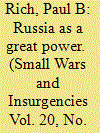

|
|
|
|
|
| Publication |
2009.
|
| Summary/Abstract |
This paper explores historically Russia's status as a great power in first the European and later the global states system. It argues that its role as a 'superpower' was really a temporary aberration during the Cold War period and that since the collapse of the Soviet Union Russian foreign policy has been essentially guided by the desire to reaffirm its great power status and emergence as an energy superpower centred on the export of oil and gas. Western policy towards Russia needs to be guided by a far more sophisticated awareness of this transformation and a greater understanding of the importance of the symbols of power and status that might look rather dated and backward looking in terms of the construction of regional European security and the 'post-national' project of the European Union.
|
|
|
|
|
|
|
|
|
|
|
|
|
|
|
|
| 20 |
ID:
124538
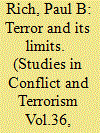

|
|
|
|
|
| Publication |
2013.
|
| Summary/Abstract |
This article argues that much of the historical analysis of terror and terrorism in history has been weak in understanding the limits on terrorist activity and how terrorist campaigns eventually end. Reviewing three recent studies that examine various aspects of terrorism and the language of terror, the article seeks to show that states often play a major role in the way terrorist movements develop and eventually end up either defeated or moving into mainstream political engagement. The article points to a number of examples to illuminate this including the Carbonara in nineteenth century Italy, the Paris Commune and the ending segregation in the U.S. South in the 1960s.
|
|
|
|
|
|
|
|
|
|
|
|
|
|
|
|
|
|
|
|
|